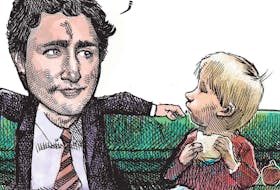By Alan English
I have been pondering the best way to respond to two recent columns in the Halifax Herald (Dec. 19): one by Union of Nova Scotia Municipalities (UNSM) President Geoff Stewart, who wants to freeze assessments, and one by East Hants Warden Jim Smith, who wants to eliminate the CAP program. Their varying opinions on how municipal property owners here in Pictou County and across Nova Scotia are taxed are influential and can be confusing.
As members of municipal councils they must surely realize their responsibilities to govern their councils is limited to legislation in the Municipal Government Act (MGA) Part IV, Section 72, Paragraph 6(a)(b), 6(A) and 7 which state: “(6) The council shall authorize the leveling and collection of (a) a commercial tax rate of so much on the dollar on the assessed value of taxable commercial property and business occupancy assessment; and (b) a residential tax rate of so much on the dollar on the assessed value of taxable residential property and resource property.
Notwithstanding clause: 6(A), the tax rate for the part of commercial property that is identified on the assessment roll as being occupied by a seasonal tourist business shall be 75 per cent of the commercial tax rate. (7) The tax rates shall be those which the council deems sufficient to raise the amount required to defray the estimated requirements of the municipality.”
A special note on paragraph (7): Provincial councils should take note that Provincial Property Taxes such as The Mandatory Education Tax, the Correctional Services Tax, the Provincial Libraries Tax and the Provincial Housing Deficit Tax are not intended to be part of the “estimated requirements of the municipality.” When added to municipal budgets it creates double taxation as provincial taxes have their own tax rates, levied by the province and intended to be a separate line item addition on property tax bills, collected by municipalities as a convenience to the province and submitted to the government. The HRM is the one municipality using the only recognized legal formula.
Councils’ difficulties seem to stem around those assessment statements in the MGA which should not be their concern, as property owners on their own have the right to deal with the Property Valuation Service Corporation (PVSC) should they have an assessment issue.
The problem with the MGA is contained in paragraph 6(a)(b) where tax rates set by councils “shall” be based on assessment. With the current CAP Assessment Program in place, the PVSC continues to spend considerable wasted time developing the Market Value amounts that CAP residential property owners see on the annual assessment notices. Those values are not used for any CAP residential taxing purposes and should be eliminated by a simple amendment to the MGA.
It appears that the PVSC, which is a separate entity within the UNSM, is advising the Union on negative portions of the CAP program they claim are detrimental to municipal taxation. The PVSC has said publicly it wants to return to market value assessment by phasing out the very popular CAP program, which was a government decision and would now be political suicide to end. It looks like they are trying to use the UNSM to lobby the Liberal Government to get their way.
Former Premiers MacDonald and Dexter, Department of Municipal Affairs Ministers Fury and Churchill have stated they would not change the legislation. Reverting to market value will no doubt result in increased property tax bills for everyone, poor and rich. In this instance, the tail is wagging the dog.
Changing the wording of paragraph 6(a)(b) to allow municipalities to set tax rates not tied to assessment and replaced by a method acceptable to property owners, such as equal taxes for equal services while still balancing their budgets, in my opinion would be the best way to go.
Also, eliminating the “not eligible” portion of the “eligible/not eligible” clause in the CAP Legislation would solve the ever-increasing tax spread problem of punishing young families seeking their first home, seniors wishing to downsize, newcomers to the province and renters. The CAP should be considered on the property, not the name on the deed. I haven’t seen any “Letters to the Editor” in favour of eliminating the CAP. Anyone needing more information can email me at: [email protected]
Alan English of Braeshore, Pictou County, is a former chairman of the Town of Pictou planning advisory committee who in recent years has been researching municipal property taxation.








